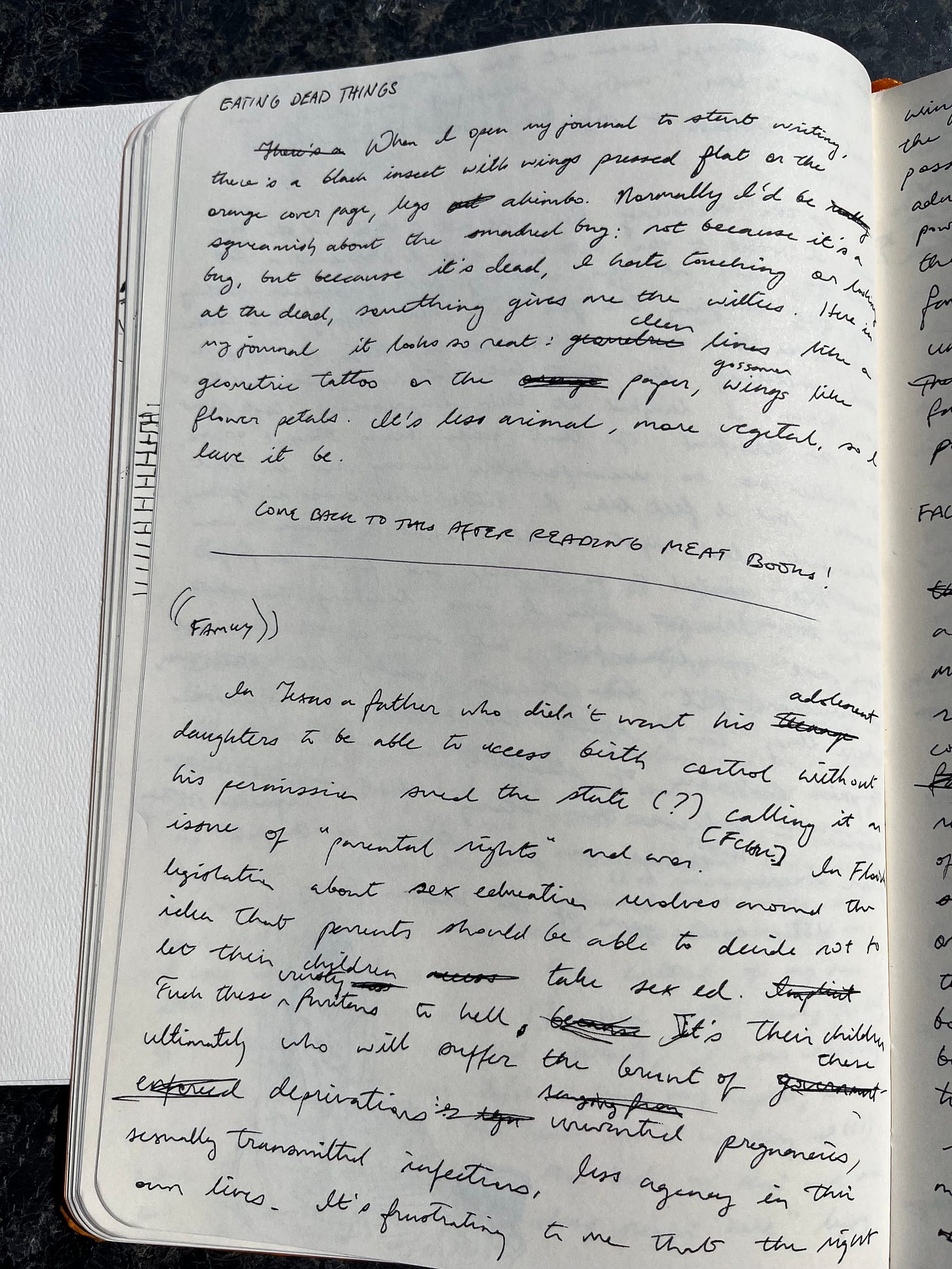false starts
It’s been hard to write. I think about all these ideas and put them in the Notes app or write a paragraph in my journal then stop, like a car with a sputtering engine.
(I don’t expect you to read this chicken scratch. It might turn into a post later or maybe not. My favorite line from this page is “Fuck these crusty Puritans to hell.”)
My friend (they/them) is going to Montreal in June to see the F1 race and I thought they were kidding because I couldn’t conceive of wanting to travel to Canada to watch cars zoom-zoom around a track, but now I realize they were serious. There’s no reason I thought of this but cars. My ex bought two cars at the same time once by accident, well by bidding for them on an auction website thinking neither would go for the bids he’d offered, and then came the emails saying both had. He reneged on one and took the other, this beautiful little car: a Nissan Figaro, really rare in the States.
One glorious sunny day in April, maybe 4/20/2021, our mutual friend sat in the front seat of the Figaro blowing great white clouds of smoke out the window. She made us take pictures. Her and this immaculate car and the blue sky and seven palm trees down below. I was going to leave everything, I knew it by that April. I couldn’t look at her too long and I couldn’t look away to the shimmering water hazy on the horizon. All that was pretty and good in California broke my heart — I cried a lot in those days.
A postdoc I met at a talk criticized the book I was reading. Lazy and impressionistic, they said. The book was Reverse Cowgirl by McKenzie Wark. It’s sort of a memoir: a lot of fragmentary accounts of drugged-up sex interspersed with reflections on being queer in 80s Australia, what it means to be a penetrated object, the feeling of desiring versus desiring to be. (McKenzie Wark was not yet living as a trans woman at the time she spends most of the memoir describing.) I felt, while reading this book, that there were things in it that felt extremely true about gender and also completely unsayable by me. In this it reminded me of Torrey Peters’ novel Detransition, Baby, which is broadly about unconventional family-making. The central trio in Detransition: Reese (protagonist, a trans woman), Ames (Reese’s ex, has detransitioned and lives as a man), and Katrina (Ames’ lover, a cis woman, now pregnant). Ames wants Reese around to be another parent for the baby. The family element is interesting. It’s also, for lack of a better word, wholesome. Babies! Motherhood! Then you have Reese’s love life — hooking up with a married man with an HIV/breeding fetish, described below (if you’re interested in this subject, Tim Dean’s Unlimited Intimacies goes in, though specific to the gay male demographic):
“This was why she still put up with him: He got it. With him, she’d discovered sex that was really and truly dangerous. Cis women, she supposed, rubbed against a frisson of danger every time they had sex. The risk, the thrill, that they might get pregnant — a single fuck to fuck up (or bless?) their lives. For cis women, Reese imagined, sex was a game played at the precipice of a cliff. But until her cowboy, she hadn’t ever had the pleasure of that particular danger. Only now, with his HIV, had she found an analogue to a cis woman’s life changer. Her cowboy could fuck her and mark her forever. He could fuck her and end her. His cock could obliterate her. His viral load was undetectable, he said, but she never asked to see any papers. That would kill the sweetness and danger of it. He liked to play close to the edge too, pushing to knock her up, to impregnate her with a viral seed. Make her the mommy, her body host to new life, part of her but not, just as mothers eternal.”
Later, there’s this:
“The reason Stanley hit Reese reversed everything both of them wanted to be true: Stanley hit Reese because she wanted him to hit her. Reese wanted to end their games, to get hit in a way that would affirm, once and for all, what she wanted to feel about her womanhood: her delicacy, her helplessness, her infuriating attractiveness. After all, Every woman adores a Fascist. Reese spent a lifetime observing cis women confirm their genders through male violence. Watch any movie on the Lifetime channel. Go to any schoolyard. Or just watch your local heterosexuals drinking in a bar. Hear women define themselves through pain, or rage against the assumption that they do, which still places pain front and center. Hear the strange sense of satisfaction when they talk about the men who have hurt them—the unspoken subtext of it being because I am a woman. [...]
The New York Times regularly published op-eds by famous feminists who pointedly ruled her out as a woman. Let them. She’d be over here, getting knocked around, each blow a minor illustration of her place in a world that did its gendering work no matter what you called it. So yeah, Stanley, bring it on. Hit Reese. Show her what it means to be a lady.”
A friend and I convened an ad hoc book club during pandemic isolation days to discuss Detransition. It was that line, “Hit Reese. Show her what it means to be a lady” that we talked about most of all, coming to no real conclusions. There are certain lines in books you walk around and walk around, circling the drain. Someone who’s read both Reverse Cowgirl and Detransition, Baby more closely than me could/should write a review of these texts side-by-side — especially on the HIV piece, because Detransition describes a post-PrEP (pre-exposure prophylaxis: medication you can take preventively to lower the risk of contracting HIV during sex) sexual landscape, while Cowgirl takes place in this era of AIDS-as-death-sentence.
A lot of Cowgirl is about wanting to be obliterated through sex, wanting to be “a thing that he would want to penetrate” and become the object of a male partner’s desire: “I had to make him feel good about himself. But he felt I only did that so he would want to fuck me. And I felt like it’s no bad thing to get your man in the state of mind where he wants to fuck you. And so on. Like petty claims court. Like heterosexuality.” Yet it still read to me as more agentive in its chosen abjection, maybe because of the scenes where Wark actively refuses conditions that are unsafe. Twice, she describes scenes of unwanted unprotected sex that lead to her walking away from partners and never sleeping with them again. The word “agentive” doesn’t quite feel right here, because I don’t think either Reese in Detransition or Wark are telling narratives on an axis of agency/subjugation; that’s me imposing a sort of liberal feminist framework, and there are other things going on.
The political scientist Wendy Brown says (“The pleasures and freedoms of silence”) that talking too much about our injuries limits the range of our possibilities, criticizes feminist theorists like Catharine MacKinnon for focusing too much on harm. What happens when the state of woundedness becomes constitutive of gender identity? (“Hit Reese. Show her what it means to be a lady.”) I like Brown, I like MacKinnon too (though both also write many things I disagree with.) I don’t know what to do about woundedness. Virginia Slims cigarettes were advertising to women in the late 1960s with the slogan “You’ve come a long way, baby.”
I read MacKinnon (1989) or even, for fuck’s sake, Beauvoir (1949), and I’m like, Yup, this seems right still. When texts that are so deeply pessimistic about gender relations have such potent descriptive power today, how long is that way we’ve come exactly?
In the morning, I couldn’t decide what to wear. 51 degrees out and sunny. Shirt? Statement sweater? Big pants? I thought of how my wide-legged corduroys would swish against my bike chain, get black with grease, how what I really wanted was to wear the same pair of jeans I’ve been wearing just about every day ($29 on sale, Everlane), but I don’t want people to think I’m boring, and it’s sort of hell to be perceived. Georg Simmel wrote about how in the metropolis we endlessly buy shit to differentiate ourselves from the swirling mass of humanity, or something. I might have quoted Simmel before on the stack, I can’t remember. Basically I quote four people ever: Wendy Brown and Catharine MacKinnon and Simone de Beauvoir and Georg Simmel. I’m kidding but I worry all the time about repeating myself, repeating someone else. It would be nice if quotes stopped knocking around in your head after you’d used them a certain number of times, like words in a word bank you crossed out on a big paper kids’ menu.
(Do you have this generic memory too: you’re 8 years old, you’ve walked into a premium-mediocre restaurant in some fungible American suburb, a 16-year-old maitre’d in lip gloss hands you a box of crayons with the nubs all worn down by your predecessors. While your parents figure out what to feed the nuclear family, you try to circle the word “LEASH” in a scramble of words under a clip art dog house you plan to flood with color soon.)
Do you think good writing makes a claim and supports it, A -> B because 1 2 3, like the steady work of building a house? Or can you forgive that I took you by the hand and went jumping from rock to rock? When I was little, I saw movies in my head that my brain made up, so writing was very easy: I wrote down what I saw. Now it’s more jumbled together, and I write about people who exist more often than the ones I make up. I think of a quote here, a paper I read there I get angry when I watch the news, I’m walking down the street and see a firetruck pass by and the first sentence of a possible short story comes: X had been married for 27 years, when on May 13th, she walked into the street and kissed a firefighter who she had never met. Some story about a homemaker blowing up her life, maybe. My phone’s crawling with notifications, I’m sorry sorry sorry about your text, missed call. I google ADHD symptoms. I pay too much money for milk tea. This whole world of false starts.
Image credit: “Hell,” Seigan Sōi, mid-17th Century, open access from the Met Collection.
(I didn’t know what header image to put so I searched “explosion” and this came up. Now I’m thinking of a short story I love by Jhumpa Lahiri from 2004: Hell-Heaven.)



